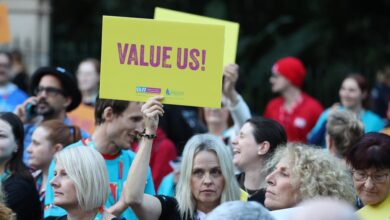Boost for indigenous nurses
A Sydney private hospital hopes more institutions will follow its lead in offering cadetships to Aboriginal and Torres Strait Islanders. By Jeremy Gowing and Thelma De Lisser-Howarth
Working within their Reconciliation Action Plan, St Vincent's Private Hospital has created an opportunity for indigenous students by offering an Aboriginal and Torres Strait Nursing Cadetship program.
The program is a significant opportunity for private sector hospitals to help contribute to indigenous Australians studying to become health professionals.
St Vincent's Private was established by the Sisters of Charity more than 100 years ago, and is a comprehensive teaching hospital covering all medical and surgical specialties, including discharge planning, extended care, clinical support and diversity health programs.
Whilst non-indigenous Australian's experience amongst the highest standards of health and life expectancy in the world, this is not shared by Aboriginal and Torres Strait Islanders.
Life expectancy is up to 17 years lower for these people, who experience higher levels of infant mortality, cardiovascular disease, diabetes, cancer and kidney disease.
Increasing the number of Aboriginal and Torres Strait Islander health professionals is seen as an effective way to contribute to improving health outcomes for these people.
St Vincent's Health Australia (SVHA) began its Reconciliation Action Plan (RAP) in 2010. This is a business plan that assists organisations to create opportunities for indigenous Australians and includes clear actions and realistic targets to achieve outcomes.
Working within the SVHA RAP, St Vincent's Private is helping to support indigenous people studying to become registered nurses.
"The nursing cadetship and the RAP resonate closely with the mission and values of our hospitals," said Mark Hales, director of mission and corporate relations and chair of the RAP sub-committee.
"These initiatives enable us to walk alongside Aboriginal Australians as we work together in the spirit of true partnership and collaboration."
<<<The cadetship model>>>
Different options for supporting Aboriginal students through their nursing degrees were explored.
These included scholarships and the nursing cadetship program, which is used successfully in public hospitals.
One of the great strengths of the cadetship model is that it gives the nursing students the opportunity to work within acute care hospitals alongside experienced registered nurses and other health professionals.
"The cadetship is certainly a program that St Vincent's Private should implement. We provide valuable support to many Bachelor of Nursing students already and we should extend this to Aboriginal nursing students," said Susan Bowen, associate nurse unit manager, when initially consulted about the program.
The cadetship program also supports the nursing cadets financially by guaranteeing employment as an assistant-in-nursing for a minimum of 60 days each year and by providing a study allowance during university semesters.
The cadetship is offered in partnership with the Department of Education, Employment and Workplace Relations (DEEWR) who provide the study allowance to the cadets via the hospital's payroll system. Combining the professional and financial support, cadetship programs assist students to complete their degrees.
<<<Implementation>>>
The team at St Vincent's Private initially achieved endorsement for the nursing cadetship program within, by speaking with all nursing unit managers and nurse educators.
Adjunct Professor Jose Aguilera, the director of nursing and clinical services, said he was supportive of the program from the beginning, however, to ensure the success of the program at St Vincent's Private, he advocated that we gain support through the shared governance structure.
After presenting the benefits of the program to the nursing executive council, the team gained hospital approval to commence. "The nursing cadetship is a very worthy program to pursue," noted Professor Kim Walker, a member of the nursing executive council.
During the process, local schools and universities were consulted, including Aboriginal and Torres Strait Islander education and nursing professionals.
The face-to-face meetings proved to be most important in achieving support and advice about running the program. Additional advice was also sought from The Congress of Aboriginal and Torres Islander Nurses. This included discussions about the mentoring program and recruitment strategies.
Natasha Franklin, nurse educator and cadetship mentor, said: "We currently have cadets working on two of our wards. They have become valued team members and we are looking forward to recruiting for 2013, when we hope to recruit two additional Aboriginal and Torres Strait Islander nursing cadets, who are studying the Bachelor of Nursing degree."
Franklin has also recently joined the RAP committee and will continue to work to introduce initiatives to create opportunities and improve healthcare for Aboriginal and Torres Strait Islander communities.
In addition to the nursing cadetship, St Vincent's Private has introduced other initiatives to improve its service for indigenous communities. The hospital continues to fly the Aboriginal flag; subscribes to Aboriginal newspapers for its foyer and Aboriginal artwork is hanging in the hospital. The traditional land owners and elders are acknowledged at events.
For clinical staff, there is online learning available, from the Combined Universities Centre for Rural Health, and a local policy on Aboriginal and Torres Strait Islander care needs. St Vincent's has supported key cultural events on campus, including NAIDOC week and Sorry Day events.
"The initiatives at St Vincent's Private help to enhance our accessibility in the community, improve relations, partnerships and services for Aboriginal and Torres Strait Islander people," said Pauline Deweerd, Aboriginal health network co-ordinator.
The team presented their reconciliation plan at the Magnet Nursing Conference in Los Angeles in October 2012 (a large international gathering of over 7000 nurses) and the RAP and cadetship programs were well received by the attendees.
They are quick to encourage other private hospitals to commence cadetships or similar programs if they have not already done so. Working with Aboriginal and Torres Strait Islander professionals and community members has been a recent initiative and can make a difference to the care provided, now and in the future.
Jeremy Gowing is nursing unit manager clinical support, and project manager emergency planning (HICS) at St Vincent's Private. Thelma De Lisser-Howarth is nurse manager discharge planning and extended care services.
Email: [email protected]




